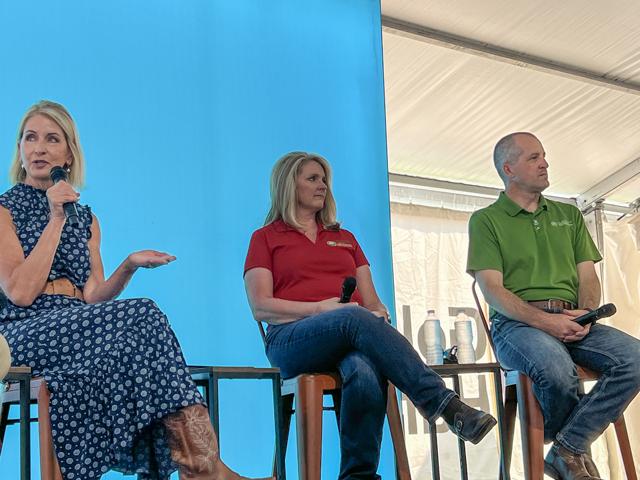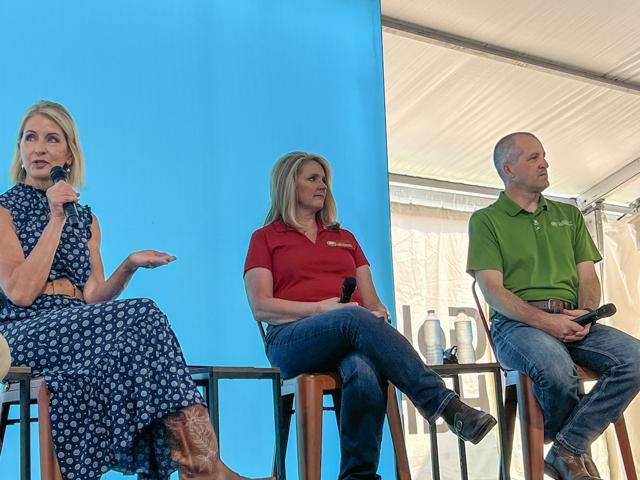Ag Policy Blog
State Ag Directors See Need to Use Farm Bill to Protect Pork Market in California
DECATUR, Ill., (DTN) -- The secretaries of agriculture for Iowa and Missouri both support Congress stepping in to draft a new law that would block the ability of states to restrict agricultural products from other states.
Speaking at a farm bill forum during the Farm Progress Show, Iowa Agriculture Secretary Mike Naig and Missouri Agriculture Secretary Chris Chinn agreed the U.S. Supreme Court decision on California's livestock space requirements -- known as Proposition 12 -- restricts interstate commerce and should be overridden by Congress in the next farm bill.
"It's essential to American agriculture," Naig said. "It's important to American consumers."
He warned against allowing states to restrict out-of-state products based on production standards. "It won't just be food. It's a slippery slope. I truly believe we're going to be fighting for market access in our own country."
Congress is considering adding the "Ending Agricultural Trade Suppression" or EATS Act, to the farm bill, which would curb states from setting several different standards for livestock handling practices -- or other laws that could interfere with the interstate commerce of agricultural products. That bill, however, has drawn pushback from more than 170 House members and at least 30 senators who have signed a letter opposing the EATS Act.
Chinn, whose family raises hogs, said it would cost $6 million to $8 million to retrofit their farm to comply with Proposition 12. "They just put a deadline on us -- California did -- on our family farm," she said.
Another problem, Chinn said, is such measures as Prop 12 don't consider expert opinions from veterinarians and nutritionists about the best practices for raising swine. "None of this was taken into consideration when Prop 12 was passed," she said.
FARM BILL DELAYS
Rep. Mary Miller, R-Ill., agreed the farm bill passage will be late. When Congress returns after Labor Day, lawmakers will be pressed to pass major spending bills by Oct. 1 or pass a bill that extends the federal government's ability to operate after Sept. 30. That puts the farm bill on the immediate backburner.
"The farm bill is in jeopardy before the shutdown because of time constraints," she said.
Miller also noted she's among the lawmakers who want to see potentially more cuts in the Supplemental Nutrition Assistance Program (SNAP), which makes up roughly 80% of spending for USDA and the farm bill. Miller said she and others want to see spending "throttled back" to pre-COVID levels.
"There are people, including myself, that want reasonable work requirements," Miller said. "I think Americans are generous people and want to help others in need. We want to give people a hand-up and a handout. But I'm on the Ag Committee to represent ag production and family farms."
P[L1] D[0x0] M[300x250] OOP[F] ADUNIT[] T[]
Still, Miller said she believed there was more funding available in the farm bill for other areas such as trade and research programs.
MEXICO AND BIOTECH CORN
The U.S. Trade Representative's Office acted earlier this month to call for a dispute settlement panel against Mexico under the U.S. Mexico Canada Agreement (USMCA) for its moves to ban the importation of genetically modified corn for human consumption -- such as making tortillas.
Miller noted the length of time that a dispute settlement could take and called on the Biden administration to take other actions that could cause Mexico to comply with USMCA's rules.
"I would hope the Biden administration would jerk their chain a little bit," Miller said. "They benefit from things in our country greatly. And I think the Biden administration could do something to incentivize them to fulfill the agreement."
Naig noted it will be a time-consuming process to sort out, but he also added it shows the value of trade agreements to prevent Mexico from simply ignoring the U.S. demands and rules over science in the USMCA.
CHINA AND AG LAND
Miller has been a vocal critic of China buying agricultural land. Tuesday's forum, however, was hosted by Golden Harvest, a subsidiary of Syngenta owned by ChemChina a Chinese state-owned entity.
"Other countries don't allow the massive buying up (of) massive amounts of land and properties," Miller said. "One of the problems is it's not just China but other countries coming in and buying up our farm ground. Farmers can't even afford to buy farm ground anymore."
More details are needed about who is buying up U.S. farm ground and Miller said the U.S. should pass a law preventing foreign buyers of U.S. farmland. Naig noted Iowa already has a state law banning foreign ownership of farm grounds.
Chinn noted Smithfield Foods, which is now Chinese-owned, has a major pork processing plant in Missouri, though Missouri has a law limiting foreign ownership of farmland to 1%. Chinn said there needs to be a balance to such laws and pointed to the value Smithfield provides as a process.
"They buy a lot of grain from farmers in the local area so there's a trickle-down impact that they have on that local economy and creating jobs and higher markets for our farming community," Chinn said.
EPA AND ESA
Chinn criticized a new proposal from the EPA that would essentially add QR codes to pesticide labels. Farmers and others would use those QR codes to discover if there are any endangered species in the area where they might be applying an insecticide. Chinn said one of the first problems with that idea is it relies on farmers having good cellular service to use the QR codes in the first place.
"If your cell phone works well that day, you're supposed to be able to go to that label and read it," Chinn said. "For us in rural Missouri, we have terrible cell phone coverage. It doesn't work well. So how are our farmers and spray applicators supposed to know what the vulnerable species is?"
Chinn said that's going to put more pressure on state Departments of Agriculture and their staff to know what the local endangered species are in every area as well.
"This is a train wreck waiting to happen," she said.
CRP AND DROUGHT
Chinn talked about drought in her state, saying cattle producers have either spent money on costly feed for their livestock or culled back their herds. She said one change she'd like to see in the farm bill is more flexibility for drought-stricken states to open up haying and grazing land in the Conservation Reserve Program (CRP) earlier. Missouri, for instance, is restricted to allowing emergency haying and grazing after July 15.
"This is one of the biggest changes that we're going to need to see in the farm bill moving forward is having that emergency ability to open up those acres early because it's about feeding people," Chinn said.
She credited USDA's Farm Service Agency for increasing the payment rate for the Livestock Indemnity Program for producers with cattle over 800 pounds. Still, Chinn added that more changes are needed to increase rates paid for losses given the higher market prices for cattle now.
"It's going to help, but it's still not enough," Chinn said of the LIP payment increase. "They need to be brought up to the current level of the economy where we're at."
Read more on DTN: "As Heat Wave Breaks in Midwest, USDA Raises Livestock Disaster Payment Rate," https://www.dtnpf.com/…
Chris Clayton can be reached at Chris.Clayton@dtn.com
Follow him on X, formerly known as Twitter, @ChrisClaytonDTN
(c) Copyright 2023 DTN, LLC. All rights reserved.






Comments
To comment, please Log In or Join our Community .